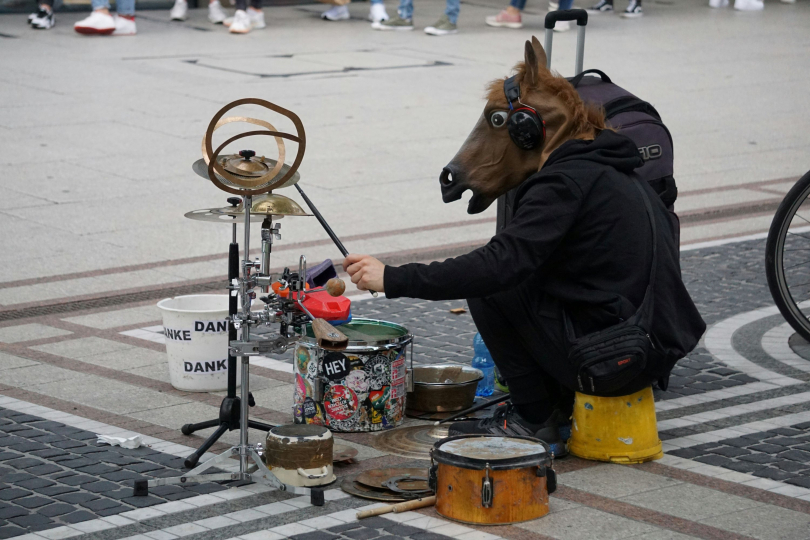
TOP 5 Negative Trends of the Contemporary Music Scene
I take cold showers, read books by smart and enlightened people, and every day I tell myself, "You are not your thoughts." I scent our apartment with candles that burn negative energy, eat lots of fruits and vegetables and exercise. And it only takes one moment during the morning subway ride, one click on a Facebook post or a mere glance at the news feed of the day... and all the positives go to waste. Suddenly I'm painfully aware of my age (somewhere between the generation X and a millennial with boomer views) and especially angry about all the annoying fads of the current music world. So let's have a little whinge and take a look at the top 5 negative trends of the contemporary music scene.
1. Overpriced tickets and mega concerts
The rising cost of living has become a media mantra that explains everything. Yes, it's perfectly logical that when the price of electricity, fuel, food or anything else goes up, it must translate into higher concert ticket prices. The cost of putting on a tour is enormous, the logistics is insane and the fans' demands for a breathtaking show are endless. What does all that lead to? All the bands and artists who earned their fame years ago and have a huge fan base (they're called legacy acts) set off on world tours with sold-out venues. And Taylor Swift, Harry Styles and all the current pop stars will do the same. Huge halls and stadiums are bursting at the seams while smaller and medium-sized clubs are closing and rehearsal rooms are disappearing (at least here in London).
This pyramid model is fantastic when you're at the top, but you certainly don't want to be an emerging band or artist with original work aspiring to eventually make a living out of it. The scissors are opened very wide and it hurts the diversity of the music scene. Because if there is no place to rehearse and no place to play the first gigs, there will be no upcoming stars. So you'll keep seeing the same old dinosaurs, big names or hologram shows in beautiful arenas, but with nothing authentic or human in them.
Bruce Dickinson has come up with a very interesting perspective on concert ticket pricing in his latest interview with Blabbermouth.net:
"[...] what's important is to try and keep, on the one hand, the right type of tickets at the right price. So by that I mean the right type of tickets, I mean, the tickets that are in front of the stage, which everybody says should be the most expensive tickets. Actually, no, they should be the most reasonably priced tickets, 'cause the people who are gonna go there to the front of the stage are gonna be people who are real fans, people who are kids, people who can't afford the crazy money, but they are the people that need to be down the front; they're the people that are gonna keep this music alive. And then you get the people that they might be fans, but they wanna bring their wife and they don't wanna get too hot and sweaty and all the rest of it. So, there's some seats at the top or something else like that, what they're gonna pick, and those get priced differently."
2. AI, algorithms and streaming
The three horsemen of the apocalypse for the musician who doesn't want to go with the flow and whose vision of original music isn't currently catching on. For example, I tried playing with ChatGPT and was impressed by its poetic abilities. Really, it can write great lyrics in English (it wasn't so good in Czech). But then it dawned on me. Why? Do I want to let go of the stimulating creative torture of writing my own lyrics? Do I want to miss out on trips into my own soul just because AI can do it faster and maybe even better? The same goes for the music that AI is and will be creating because we can't avoid this evolution.
The respected anthropologist, intellectual and activist Noam Chomsky called AI an adored plagiarist. He's right, because AI only compiles vast amounts of data, but doesn't really create anything. The algorithms on Spotify work in a similar way, recommending many unknown bands and music based on your preference, but actually creating an information bubble over which you have minimal influence. You miss out on the mystery and serendipity of discovering new bands and trends.
Nowadays, fans chat about what an algorithm or influencer recommended to them (which another algorithm sent to their feed), not about which unknown band blew them away at a concert or what gem they discovered while randomly browsing records in a store. Streaming is a marvel of technology, where you have an endless supply of music under your thumb at a moment's notice, available essentially for free, in high quality and with the ultimate user interface.
However, there is also a pyramid system at work here (like in the good old days) with selected musicians eating caviar with soup spoons and the rest, the others, making tea out of yesterday's socks (this is a metaphor, okay?). I still believe we can find fairer, more interesting and ultimately more fun ways to distribute music.
Noam Chomsky puts our critical thinking far above the derived coarse correlations of data available to AI: "The human mind is a surprisingly efficient and even elegant system that operates with small amounts of information."
3. Ultra production
I don't even want to mention the thousand times discussed autotune. It's already ubiquitous in music. It's as necessary (and annoying) a part of our lives as constantly filling in login details for all sorts of (often mandatory) applications. A weed you have no chance of getting rid of. In general, production (especially in pop) is quite a science. All those plugins and digital tweaks can do absolutely anything. You can sit down with your laptop under a chestnut tree in the park and produce a whole track which is radio quality with the highest pro sound parameters.
That's amazing, but a little scary at the same time. Since it takes away the arduous process of communicating with other musicians, sound engineers, producers, record company reps and other industry people in the "old" recording process, you can focus fully on achieving technical perfection. The result is a polished, refined recording with a rich sound and perfect execution of all instrumental and vocal parts. The technical possibilities are now so far advanced that you can authentically reproduce all the instruments to such an extent that the listener has no way of knowing whether it was recorded by a professional in his field or someone who just tapped it on a keyboard.
For example, I stopped understanding modern metal with all these absurdly down-tuned instruments, gate to the max, unplayable drum parts (where no one knows if the drummer even played it in the studio) and bombastic choruses that would put Katy Perry to shame. Everything sounds incredibly dense, precise and perfect. I'm tired of listening to this style of recordings. My soul needs to feel the musicianship behind the instruments and vocals (with top production, of course, no question about it) and also some space and dynamics in the music without something always jingling, flowing or exploding in the ecstasy of modern sound design.
4. Endless marketing
This is something that probably every musician hates, but has to do. You share everything on social media, you run fundraising campaigns for your new record, you promote your upcoming gigs to the hilt, you sell every shitty merch and yet you're plagued by nightmares of irrelevance. What if I'm out? Do I have enough likes, comments, followers and subscribers? How many social networks should I have a profile on? And where will I be really "in"?
This involves the complex machinery of building your own "brand" and identity that will work in the yuppie world of online media. You promote a record before it's made, during its production and most of all after it's released. And then again and again. Like the hamster whose cute little legs keep wiggling in a spinning wheel. After this, your only motivation to break through is to make enough money be able to to pay a marketing agency or anyone to take care of your Instagram or Facebook account.
Er, wait. Facebook? This must be the prehistoric world, a place where only 40+ dinosaurs live. However, on TikTok and such (which is big in music marketing right now), you'll have to do everything yourself. Because "authenticity" sells the most. One is so authentic it makes his toes curl.
5. Meta absurdity
The most apt example is the absurd trend of reaction videos. They are hugely popular and often get more views than the videos where someone is actually trying to play something. In order to become a star, you just have to watch another video or a recording of something famous and then make the craziest faces possible, saying "Oh my God" or "Sick" or another really original phrase over and over again. Then you interrupt it a thousand times to say your opinion on this or that and you have a viral reaction video, which someone else can react to. This creates an endless loop of reactions to reactions to reactions.
Some individuals have taken it so far that they don't even talk anymore, they just film themselves looking at something or listening to something. They don't even try to make faces anymore, they just place their face-person in the original video. What on earth have we come to? We go to a restaurant, film our food, and with the first bite, we film ourselves making "yummy" or "yuck" faces and immediately come up with a verdict on a numerical scale accompanied by a commentary about our taste sensations.
Something similar is happening in the music world. You need to have an opinion on everything, make a video about it and preferably a podcast, where you sit with your mates for two hours and reverberate clichés that have been repeated a thousand times. Of course, the online media world is not just about reaction videos and podcasts with people who should be listening rather than talking. If you do your research, you'll find amazing sources of information and incredibly talented musicians who can both play and create pro content and draw you into their world in an unobtrusive way.
Whew, what a relief. Sometimes you need to cleanse your soul and share a negative perspective. We'll have to stick around with many of the trends mentioned above for a while, but I firmly believe that in the end, only what truly holds quality and meaning for our souls will remain. It's nice to vent like this and then move on, pursue your creative endeavours and focus on what brings you happiness, fulfilment and inspiration.
If you have found an error or typo in the article, please let us know by e-mail info@insounder.org.





